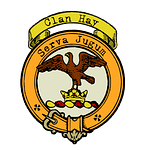Welcome back to "A Clan A Day Podcast" brought to you by bagtownclans.com. I’m your host, Colin MacDonald, and today, we’re diving into the fascinating history of Clan Fergusson. Known as the “Sons of Fergus,” this clan has roots that stretch far back into the mists of Scotland's early history. The name Fergusson is an Anglicization of the Gaelic “MacFhearghus,” meaning “son of Fergus,” a name of ancient Celtic origin. Although they are often considered as one clan, the Fergussons are a collection of distinct families spread across Scotland, from Argyllshire to Aberdeenshire, each with its own unique history and legacy.
The Fergussons of Argyll, who held the estate of Glenshellich, were hereditary sheriffs of Strachur and closely aligned with the powerful Clan Campbell. These Highland Fergussons, though not numerous, were significant in their influence. In the 16th century, they were recognized among the septs of Mar and Atholl, with their proper seat originally in these regions, where they had their own chiefs and captains. However, the direct line of these Fergussons became extinct after they sold their lands in 1801 to cover debts, a fate not uncommon among Scottish clans as the centuries wore on.
Meanwhile, in Perthshire, the Fergussons of Atholl and Balquhidder were known for their rebellious spirit, often causing trouble for the King's authority. Like their neighbors, the MacGregors, these Fergussons were fiercely independent and frequently at odds with the crown. Yet, many of them were also staunch supporters of the Stuart cause, fighting under leaders such as Montrose, Bonnie Dundee, and even taking part in the ill-fated charge with the Atholl Brigade at Culloden in 1746. This demonstrates the complex and often contradictory nature of clan loyalties, as many Fergussons from Argyll, Aberdeenshire, and the Lowlands sided with the Hanoverians, often finding themselves on the opposite side of the battlefield from their Highland kin.
One of the most influential branches of the clan emerged from Kilkerran in Ayrshire. The Fergussons of Kilkerran, though technically a Lowland family and unrelated to the Highland Fergussons, rose to prominence in the 18th century. By then, the head of the Kilkerran family was increasingly recognized as the senior figure among all Fergussons, a status that remains today with the Kilkerran line regarded as the chiefs of the clan.
Among the many distinguished members of the clan, Sir Bernard Fergusson stands out. Created the 1st Lord Ballantrae, Sir Bernard served as Governor-General of New Zealand from 1962 to 1967, representing the crown with distinction and exemplifying the martial and diplomatic prowess for which the Fergussons have long been known.
The origins of Clan Fergusson are steeped in legend. Gaelic tradition suggests that the clan descends from Fergus Mór, a king of Dál Riata who came from Ireland to Argyll in the 6th century. This Fergus is often credited with being one of the founders of the Scottish nation, and his legacy is claimed by various families bearing the Fergusson name. While the historical evidence for this direct lineage is unclear, the mythic connection to Fergus Mór certainly adds to the clan’s mystique.
A fascinating tale from the late 16th century illustrates the clan’s long-standing influence. In 1583, after King James VI’s escape from the English faction lords who had captured him at the Raid of Ruthven, he summoned several ministers of the Kirk to Dunfermline. Among them was David Ferguson, a witty minister who saved the day with his humor. Ferguson quipped that as a descendant of Fergus, the first Scottish king, he had cheerfully relinquished his title to James, a move that won the king’s favor and ensured a peaceful dismissal of the ministers.
Moving forward to the early modern period, the Fergussons of Kilkerran began to establish themselves as a formidable legal and political force. Sir John Fergusson, born around 1653, became a prominent lawyer and was created a Baronet of Nova Scotia in 1703. His son, James Fergusson, known as Lord Kilkerran, became a judge of the Supreme Court, further cementing the family’s influence in Scottish affairs.
The Kilkerran Fergussons have produced many notable figures, including General Sir Charles Fergusson, who served in the British Army for nearly four decades, and the late Right Hon. Sir James Fergusson, who held various prestigious posts, including Governor of Bombay and South Australia. Sir Charles Fergusson, the present head of the family, is a distinguished soldier who served with honor during the Sudan War and the First World War, continuing the clan’s proud military tradition.
Throughout its history, Clan Fergusson has been associated with both Highland and Lowland Scotland, reflecting the diverse paths taken by its members. Whether fighting for the Stuarts or the Hanoverians, serving as sheriffs, or making their mark in law and politics, the Fergussons have left an indelible mark on Scottish history.
Today, the Fergusson name is still proudly borne by many, and the clan's history continues to be celebrated by those who cherish their Scottish heritage. From their legendary origins to their modern-day achievements, the Fergussons exemplify the resilience and adaptability that have defined Scottish clans for centuries.
Thank you for joining us on this journey through the history of Clan Fergusson. Be sure to tune in tomorrow for another episode of "A Clan A Day Podcast." I’m Colin MacDonald, and as always, Go n-éirí an bóthar leat.













Share this post